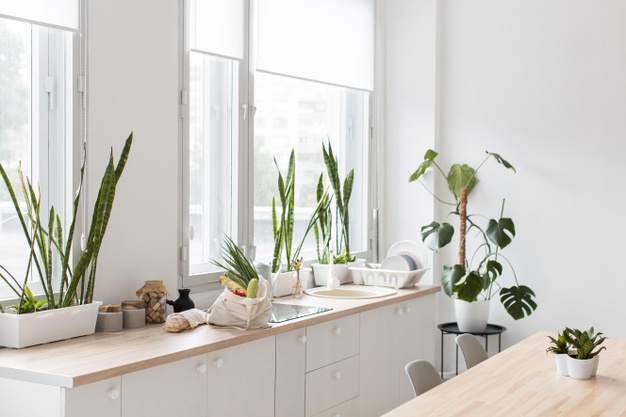
International Plastic-Free July means that the whole world’s gets the opportunity to reassess, manage and adjust our attitudes and behaviours when it comes to plastic use. In commemoration of International Plastic-Free July, we at Conscious Lifestyle Collective launched the 30 day plastic-free challenge with the aim of educating and providing you with an opportunity to look into the ways you can be more plastic-free. The challenge is divided into four focus areas covering bathroom, kitchen, shopping and eating out.
In this instalment of plastic-free month, we are providing you with all you need to know about how to get your kitchen to be more plastic-free!
Disposing Waste
Problem
- If you want to assess how much a plastic-free approach makes an impact on your life, the kitchen is the best place to do so. This is because much of our waste originates from the kitchen space. This is relevant, not only for food waste, but also waste that is related to our food such as packaging. Waste also comes from how we run our kitchen, such as how we clean our surfaces and scrub our posts.
Solution
- Arranging your waste is the easiest way to achieve a plastic-free kitchen. You can arrange your waste into two categories, namely: Food Waste and Non-Food Waste
- For your non-food waste, you can further arrange your waste in the following way: (1) Have a set of disposal site that makes room for the four categories of waste; (2) Label each categories “plastic”, “paper”, “glass”, and “metals”. This is waste that you will be repurpose, reusing or recycling.
- Once you have disposed your non-food waste into the following waste categories, you can start by deciding which materials you will be repurposing and reusing yourself. You can then find out about your municipality’s policy or schedule on recyclable waste so that you can know more about how to dispose of your recyclable waste. If your municipality does not provide this service, you can mobilise members of your community to employ the same recycling habits and come up with a disposal solution. Alternatively, you can reach out to a small business that specialises in handling recyclable waste.
- For your food waste, you can further arrange your waste by separating what would make for good compost from food waste that would not. If you would like to know more about how to make compost for your garden, click here to watch a video on how you can make a compost. Alternatively you, you can read our guide here on how to make your own compost for your garden.
Benefit:
- By arranging your waste into non-food waste and food waste (and take the necessary actions explained above in the respective categories), you will find that you reduce your waste by a significant portion. You will also realise that much of what you may think of as useless waste actually still has productive qualities and purpose. .
- Arranging your waste also helps with managing your space.
- Because you have managed you waste and the spaces which that waste sits, you reduce the risk of catching illnesses caused by rotting matter. Communities that are located by landfills currently suffer from this problem. This is why it is important to dispose of our waste correctly, so that we can reduce the occurrences of landfills that pollute the environment and cause ill-health.
- Arranging your waste is also a money saver. This is because you are reusing the materials you would normally throw away and replace almost immediately. You are also spending less money buying multiple refuse bags to accommodate all your waste.
- The small-to-medium enterprises sector to blossoming with entities whose objectives into resolve the environmental crisis. By recycling, repurposing and reusing your waste, you are supporting local businesses that are playing a role in resolving the environmental crisis. If you would like to find out who is doing what in the eco space, visit our Directory of South African Eco-Friendly Businesses.
Food Shopping and Food Packaging
Problem
- Although COVID-19 might have made some changes to the way we do out shopping (such as resorting to shop online and have our goods delivered to a central place or to our doorsteps), many of us are still stuck in our old ways when it comes to our shopping habits. We shop in the same places. We stick to the same brands. We still carry our groceries in (plastic) bags that we don’t use more than twice or thrice. What we may regard as convenient shopping practices are really just habits that are counterproductive for saving our resources, our money and our environment.
Solution
- When it comes to carrying your groceries, you can replace your plastic bags with boxes made from reusable material, such as cardboard or even a crate with wheel that you can fit in your transport.
- Supporting small business that like fruit & vegetable stands/markets, as well as supporting plastic-free grocers.
Benefit
- When you use reusable boxes to carry your groceries, you cut down on the cost of buying plastic bags. Remember, an average South African uses between 30kg-50kg of worth of plastic bags per year. 1 plastic bag is worth 5.5g and costs an average of 60c. Reusable boxes also reduces your our put of single-use plastic, which is known to be the kind of plastic that is causing the greatest damage to the environment and the livelihoods in which those environments thrive.
Keeping You Kitchen Clean
Problem
- The problems we experience with keeping our kitchens clean from an eco-conscious tint of view, are the same problems we encountered when we discussed Disposing Waste & Food Shopping and Food Packaging. Many of the cleaning products we buy are either made from or packaged in plastic. Because of the low recycling rates per household in South Africa, many of these plastics end up being disposed incorrectly and polluting our environment.
Solution
- One way to reduce our reliance of plastic is to reuse the plastic containers we already have. This is particularly helpful with empty plastic containers (which do not necessarily have to be from cleaning products, but any other area of our lives). For example, you can reuse a just of bleach as a water cannon for your garden. Or using cream plastic tubs as pots for small plants.
- Another way to reduce our plastic footprint is to do a plastic-free swop. Click here for a small guide on how to make plastic-free swops that will make a difference in you kitchen.
Benefit
A general kitchen swop on the tools you use to keep your kitchen clean presents opportunity for the following:
- Waste reduction.
- Space reduction.
- Disease reduction (chances).
- Money saving.

